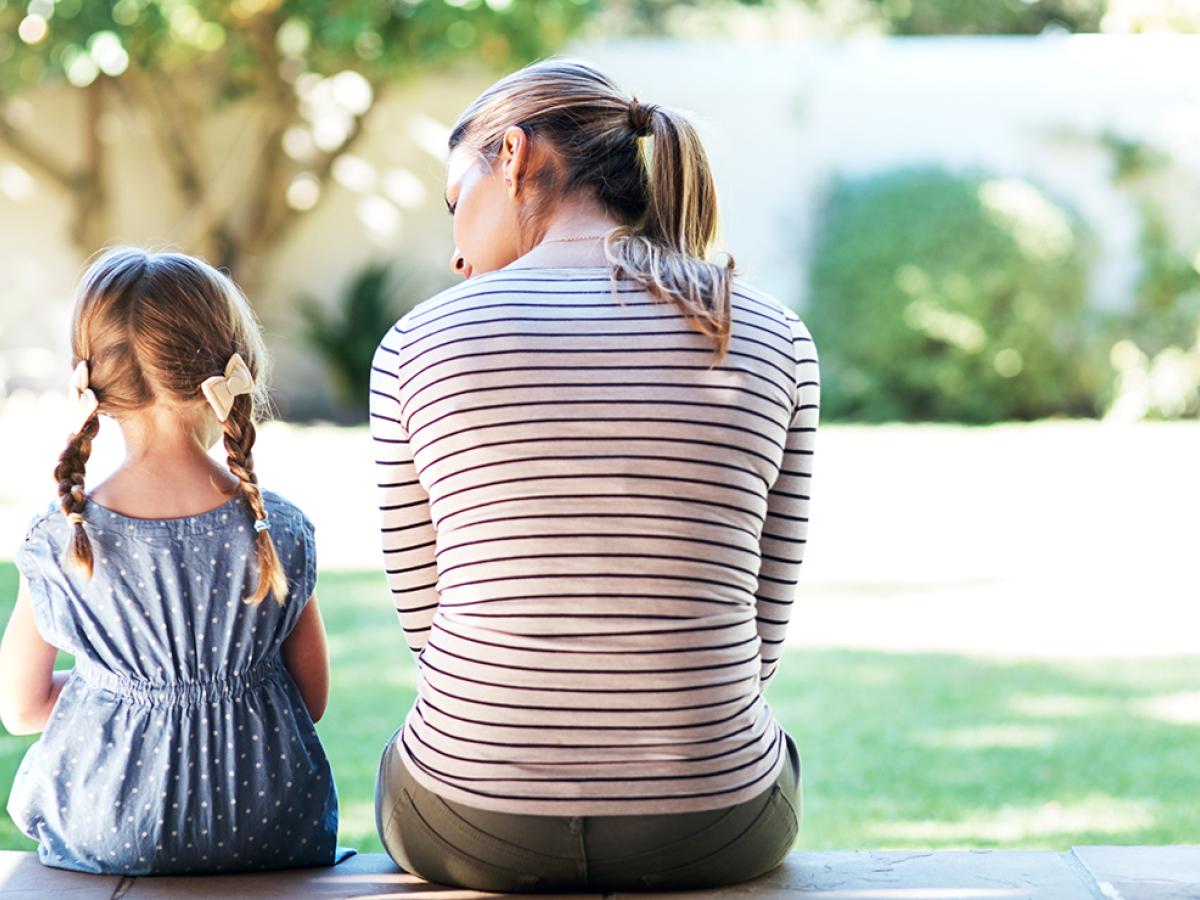October 24, 2023

Navigating death and grief is tough enough for adults. But when loss also touches your child, how should you handle it as a parent? How much can they understand? Will you know if your kid is struggling?
For answers, we turned to clinical social worker Lacey Prater, a member of MU Health Care’s Journeys - Pediatric Complex Care Team, designed to support for children and families who are dealing with a life-limiting or life-threatening medical condition.
“With proper guidance and supportive conversations, children handle death much better than people expect,” Prater says. “And if we introduce it to them when they’re little, we can set them up for a healthier lifelong relationship with death and grieving.”
Prater offers the following tips for managing death and grieving with your kid:
1. Factor in Your Child’s Age
People of every age feel it when a strong connection is broken — whether with a human or a pet. Even infants and babies may become fussy or clingy after the death of a caregiver — especially if it causes a change to their routine or you are extra emotional around your baby.
“If kids can understand attachment, know who their caregiver is or have a bond with someone, they’re going to have a reaction when that connection is gone,” Prater explains. “We need to provide support after a loss at any age.”
Your child’s age and development will affect the conversation, but you can expect:
- Toddlers/pre-kindergarten: Your toddler may repeatedly ask the same questions about death. They may seem excitable, exhibit attention-seeking behavior and bounce between emotions quickly — showing sadness one moment and asking to play or get a snack the next.
- Elementary school age: Your school-age kid may focus on how the death directly affects them. Who will take them to school? Who will come to school on Grandparents’ Day? Provide reassurance that things will be okay and outline any changes for them.
- Adolescents and teens: Peer groups are very influential at this age, so your tween or teen may turn to a friend instead of you to talk about it. They may look for a way to maintain the connection with the loved one they lost.
2. Take Advantage of Grief Resources
Don’t expect to have all the answers, especially if your loved one’s death is unexpected. But it may help to take time to prepare yourself before talking to your child about it.
There are plenty of people and resources available to help before and after the conversation, including:
- Librarians can guide you to adult books about grief for you or your child.
- Online resources can outline what to expect and age-appropriate language.
- Medical professionals such as your child’s pediatrician or your primary care provider can guide you and refer you to appropriate community resources.
- Teachers and school counselors have experience managing childhood grief.
- Social workers and child life specialists are trained to help families and children manage grief.
- Faith leaders may offer comfort and help you answer your child’s questions about what happens after death.
“Look online, grab a children’s book or ask a social worker or counselor to help you figure out what you want to say,” Prater says. “Doing some research can help you feel confident going into the conversation.”
3. Let Your Child Lead
Just because you are prepared for the conversation doesn’t mean your child is. Some kids will be ready to open up. Others may shut down and need more time.
“Begin by saying, ‘If you feel like this is too much, let me know, and we can stop,’” Prater says. “You can come back to the conversation later.”
If your child engages in the conversation, allow them to interrupt with questions. Their questions can guide the rest of the discussion.
4. Be Literal
You may think you are softening the blow by saying their loved one “went away” or that “we lost them.” But that language can confuse kids, especially younger ones who don’t understand abstract concepts and may develop unnecessary fears.
“It’s important to give them facts and make connections,” Prater says. “Don’t be afraid to use the words ‘death’ and ‘die’ with kids of all ages.”
For example, explain that your pet or loved one died because their kidneys stopped working, and our body can’t work when our kidneys don’t work. But remind your child that healthy bodies like theirs heal when they get sick.
5. Let Your School-Age Child Decide Whether to Attend the Funeral
Children need closure, just like adults do. While a funeral achieves closure for some people, it may or may not be the right choice for your child. Prater advises that you leave it in your child’s hands to decide. Have a conversation explaining what a funeral is, what it will look like and why we have them.
“Most kids will decide for themselves,” Prater says. “And if they don’t want to attend, you need to respect that. Ask them if they want to make something or participate in the service in some other way. Make sure they have someone they can spend time with that day.”
6. Loop in School and Other Significant Adults
Reaching out to the adults your child spends time with is always a good idea. They may see a different kid than you see at home and can communicate any concerns.
“It also gives your child another adult to talk to, especially if you are grieving too,” Prater says. “They may be worried about you and need to talk to someone about it.”
Let your child know that you’re contacting those adults. If they resist, explain that you’re simply building a support network for them, and they can choose whether they want to lean on it.
7. Pay Attention After the Conversation
Every child will experience loss differently depending on age, developmental level and connection to the deceased. But some behaviors may be cause for concern.
Prater says those red flags include:
- Self-harm
- Harming others
- Grieving that affects their daily routine (eating, sleeping, going to school) for an extended period
Reach out to your child’s pediatrician if you are worried about your child’s mental or physical health after the death of a loved one. They can assess the situation to get your child the help they need.
8. Keep the Conversation Going
As kids mature and their understanding of death changes, their grief may intensify and resurface — even years later.
“Their feelings of loss may pop up at high school graduation or other life milestones when they wish their loved one were there,” Prater says. “You’ll likely need to go back and touch on death and loss at every new developmental level as they grow up.”
Next Steps and Useful Resources
- Want to know more about MU Health Care’s support for kids? Learn more about our Child Life services
- Curious about how to talk to your kid about war? 5 Tips to Get You Started


